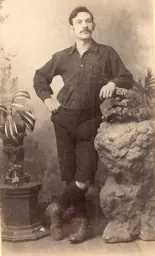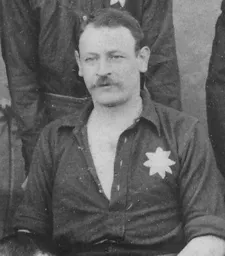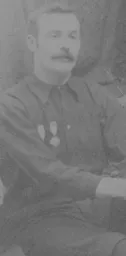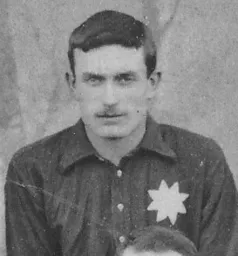The Luton Reporter -
“Luton and the English Cup. Luton Town v Swindon Town. This match in the first round of the qualifying series of contests in the English Cup competition was played in the Athletic Grounds on Saturday. The weather was brilliantly fine during the day and this doubtless had some influence on the attendance, which was an excellent one, upwards of 2,000 persons lined the ropes. The visitors arrived at about 1 o’clock, having been travelling for four hours, and operations commenced fairly punctually. The Swindonians came with a high reputation, for their brilliant victory over the Casuals in the previous week had done a great deal to raise them in the estimation of the football world. They amply sustained their football reputation for excellent all-round play, but the home players proved more than a match for them and the result of the best contested game that has yet been played on the ground was that the visitors had in the end to acknowledge defeat by four goals to three. The details are as follows:-
The home captain lost the toss and the Lutonians defended the goal at the gas-works end during the first half. The sun was shining very brightly in the faces of the Luton men during this time and not only did they labour under this distinct disadvantage but they were also playing against the wind. The elevens faced the central circle in the following order:- Luton: Goal, J. Burley; backs, A. Sanders and J. Hoy; half-backs, J. Wright, A.H. Taylor and H. Paul; forwards, H.W. Oclee (centre), H. Whitby, M. Cheshire (left), G. Deacon and F.K. Whitby (right). Swindon: Goal, F. Crossley (captain); backs, G. Plimley and W. Richardson; half-backs, F. Parker, E.G. Wainwright and H. Lewis; forwards, H. Offer, R. Reynolds (right), R.H. Davis (centre), R.L. Jones and J.H. Hayward (left). Oclee kicked off a few minutes after 3, and his companions at once pressed, but the visitors’ backs obtained possession and promptly carried the fray into their adversaries’ territory, the ball being kicked over the cross-bar. “Hands” against each team followed, and Swindon again kicked too high. Deacon was about this time lavishly applauded for a fine run in the course of which he eluded two or three of his heavy opponents. The Swindon forwards had already given evidence that their combination was infinitely better than that of the home team, and by means of some fine passing they managed to work the leather into dangerous proximity of the home fortress on more than one occasion. They were never, however, able to baffle Sanders, who was playing a sterling game. Their tactics when in front of goal were not successful, for had they been smarter they must have inevitably have scored two or three times. Some admirable play by the Luton forwards resulted in a sharp scrimmage in front of the Swindon uprights, but nothing came of it, the ball striking one of the posts. Oclee, who was hurt hereabouts, was ruled off-side and a penalty kick was granted to his opponents, who also obtained a “corner” directly afterwards, despite a fine attempt by Sanders to save the ball going behind the line. The penalty kick was splendidly made into the mouth of the Luton goal, but the danger was averted, Paul and Sanders being very conspicuous just now. Burley next had an opportunity of exhibiting his defensive powers, these being severely taxed for a space. Shot after shot was poured in, but the Luton custodian showed himself equal to the emergency and the cheers of the spectators were freely lavished upon some great saves. The visitors penned their opponents in, but they were somewhat weak in front of goal and thus several opportunities were allowed to slip. Deacon, who had been playing an extremely plucky game, next evoked the cheers of the admirers of his side by a splendid run, and it was only by kicking out of bounds, that Plimley was able to prevent a score resulting. Deacon continued to shine, and from a pass of his F. Whitby was enabled to kick the ball into the space immediately in front of the goal. Oclee failed in his shot, but a “corner” followed. Sanders had a further opportunity of giving his enemies a taste of his quality and he was always equal to the occasion, the lion’s share of the work at back being performed by him in admirable style. “Corners’ fell to Swindon in rapid succession at this stage, and the supporters of the home combination experienced an anxious time. First H. Whitby conceded a “corner,” then Wright made a mistake by kicking in the direction of his own goal, and Taylor followed by heading the ball over the cross-bar. Hoy, however, rendered himself conspicuous and was instrumental in transferring the scene of operations to the other end of the field. The Swindonians quickly retaliated, and from a grand shot from the left wing, Burley succeeded in making the “save” of the season. The ball was travelling at great pace and it seemed almost impossible to avert the disaster, but the Luton keeper, behaving in the coolest conceivable manner, disposed of the leather. Sanders next relieved very finely, and F. Whitby and Deacon managed to get the ball up the field, but a weak kick at the critical moment rendered their efforts nugatory. By means of some excellent passing the Swindon forwards were enabled to again Burley’s charge, but Sanders, running from his place, averted the danger. Shortly afterwards Burley again distinguished himself by defending his citadel in face of a determined attack, but the visitors were not to be denied and ultimately Jones was enabled to credit his side with first blood. From now to half time the teams took turns in pressing, but it must be confessed that the Swindon rushes were more dangerous than those of the home division, and Burley’s ingenuity was severely taxed more than once. At one time he fell with the ball in his arms and Offer rushed up to charge him, but the Swindonians were not quick enough, the home custodian throwing the ball some distance up the field. At length Offer was enabled to have his revenge for this disappointment, and shortly before the arrival of the end of the first period he added a second point. When the whistle sounded for the usual interval the visitors had scored two to their opponents nil, and things looked bad for the Town men. Shortly after the resumption a different complexion was put upon the game, for the local players scored twice in rapid succession. On the first occasion the leather was well taken down and from a good “centre’ by F. Whitby, Cheshire scored by a fast shot. Within five minutes the same player was enabled to take a snap kick from a throw in and Crossley failed to stop the ball. This made the score level, a result which was received with tumultuous cheering by the supporters of the Luton representatives. Both teams were now upon their mettle and they struggled gamely to obtain the advantage. For a considerable space the play was confined to the middle of the ground, occasional breaks away relieving the monotony. Each side experiencing hard luck, some splendid attempts being frustrated. Deacon, H. Whitby and Taylor were rendering themselves conspicuous on the home side, while the visiting forwards were most noticeable on their side. It was not until a quarter of an hour before time that any further advantage was secured, and the courage of the Luton partisans dropped considerably when Reynolds obtained a third notch for Swindon. Immediately thereafter the ball was forced through a fourth time, but the referee had whistled for “off-side” and the score was consequently disallowed. Five minutes later Deacon evoked enthusiastic shouts by equalising the scores from a throw-in, and the home eleven now tried all they knew to obtain the advantage. With about five minutes left to play Sanders sent in a magnificent shot and H. Whitby put on the finishing touch by heading through the goal. The wild scene of jubilation which followed is indescribable, for it was generally recognised that this was the deciding point. Hats were tossed up in all directions and the spectators shouted themselves hoarse in their excitement. From now until the end the Lutonians acted on the defensive and when the referee’s whistle announced that time had expired the home representatives had won a stoutly fought game by four goals to three. The players were rapturously cheered on returning to the pavilion and they amply deserved their reception, for their success was as unlooked for as it was welcome. The linesmen were Messrs A.E. Holland and T. Keens, Jun and Mr R.E.A. Maynard (hon. sec. of the Reading Standard Cup) won golden opinions by the irreproachable way in which he filled the difficult post of referee. His decisions were devoid of the slightest suspicion of bias throughout, a fact which will be patent when it is intimated that they were unchallenged.”












